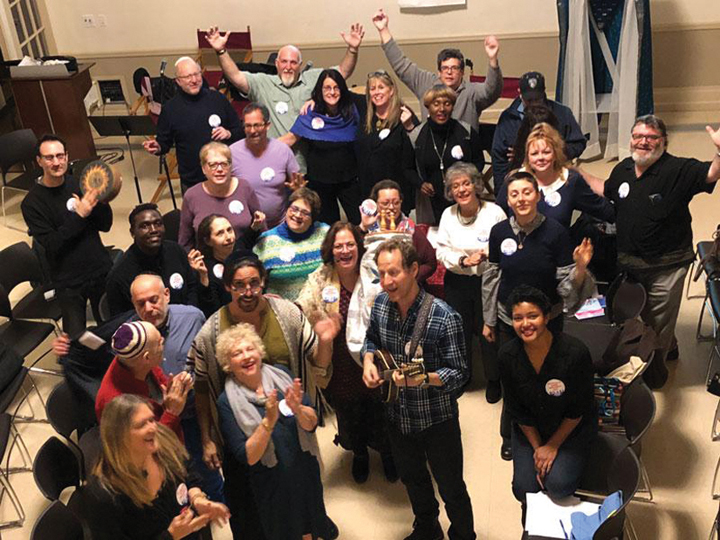
The growing Jewish movement for refugees was strongly evident in hundreds of communities across the country in mid-Otober.
In 33 states and Canada, at nearly 300 gatherings, Jews came together Oct. 19-20 to observe HIAS’ National Refugee Shabbat. In synagogues, churches, JCCs and other spaces, thousands dedicated sacred time and space to raising awareness about the global refugee crisis. Whether you were in Portland, Maine, or Bristol, Tennessee, Salt Lake City, Utah, or Santa Monica, California, there were multiple opportunities to learn, reflect and ultimately take action for refugees and asylum seekers.
Drawing on local relationships, communities put together a range of meaningful programs, many utilizing HIAS’ Programming Content Resource. Some focused the music and liturgy of their Shabbat services on the refugee experience; others lifted up the voices of refugees and asylum seekers through narrative, or heard first-hand from individuals who shared their own stories. Many clergy devoted their sermons and Divrei Torah to the connection between the contemporary global refugee crisis and Parashat Lech Lecha, the story of Abraham leaving home in search of an unknown destination.
In New York City, the Synagogue Coalition on the Refugee and Immigration Crisis (SCRIC) came together for an interfaith Havdalah event that involved a multi-faith group of clergy. SCRIC noted that their programming represented collaboration with other faith-based groups to support the work of HIAS.
At Temple Beth-El in St. Petersburg, Florida, featured speaker Stacie Blake, director of government and community relations at the U.S. Committee for Refugees and Immigrants, shared a conversation with a group of participants: “A woman said that she supported refugees but her neighbors probably didn’t and that she wouldn’t know what to say to them. I reminded them that they grew up with the same stories. The only things that have changed are the faces.”
Three congregations in Los Angeles — Temple Emanuel of Beverly Hills, IKAR and Temple Beth Am — came together for a Havdalah service that featured music by a Syrian Jewish musician, several speakers including refugees and asylum seekers and a dinner catered by a Syrian refugee family.
At Congregation Beth Torah in Overland Park, Kansas, community members shared their personal immigration and refugee stories following services. One participant told HIAS, “At my table, we had some people who at first felt they did not have an immigration story to tell. They had been in Kansas for a few generations. We encouraged them to think that at one point, everyone had come to America in search of opportunities and a better life for themselves and their descendants. It was powerful to see them feel part of the narrative of refugees and migration.” The synagogue encouraged all present to take one action: to vote for candidates “who share our values of welcoming the stranger and treating everyone with fairness and compassion.”
At National Refugee Shabbat events across the country, participants asked what else can they do to help refugees and asylum seekers. We at HIAS have an answer: take action before the midterm elections through HIAS’ Vote for Welcome campaign. The campaign seeks to raise the profile of refugee issues, educate candidates about the importance of refugee protection and ask candidates to take a public stance on the issue of refugee resettlement. At this critical moment, the need to raise our voices has never been greater.
HIAS National Refugee Shabbat was co-sponsored by: Academy for Jewish Religion, American Jewish Committee, Anti-Defamation League, Jewish Council for Public Affairs, National Council of Jewish Women, Network of Jewish Human Service Agencies, The Rabbinical Assembly, Reconstructing Judaism, Reconstructionist Rabbinical Association, T’ruah: The Rabbinic Call for Human Rights, Union for Reform Judaism and United Synagogue of Conservative Judaism.
This article originally appeared on HIAS’ blog at hias.org.


